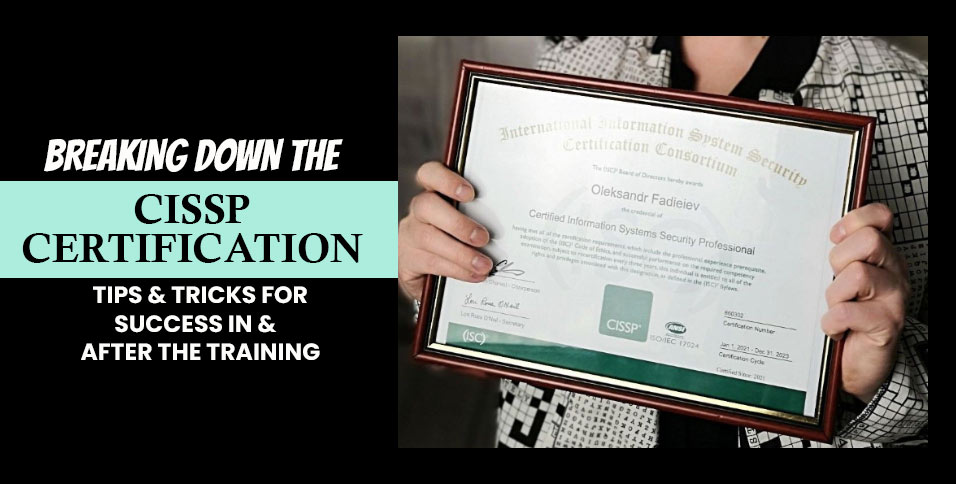IT security professionals who want to boost their career in the cyber security field must avail the Certified Information Systems Security Professional certification. Across multiple industries, organisations need to secure data and other information from cyber attacks, which makes the professionals with CISSP Certification valuable assets to multiple companies. With a CISSP certification, candidates represent their worth in protecting web-based information systems.
The CISSP certification stands among the gold standards for cyber security and IT professionals. This credential helps individuals secure lucrative salaries, knowledge of updated industry advancements, and competitive benefits in the job market.
What is CISSP Certification?
The CISSP certification is a professional certificate that helps professionals work in information security. The International Information Systems Security Certification Consortium (ISC2), also known as CIS2. This certificate is among the highest-paying information security certifications in the world of IT. Professionals with relevant work experience and the CISSP certification can grab the best-earning job positions in this field.
The CISSP certification course offers you medium-level management training. Once you complete the certification, you can also proceed with other certifications to enhance your knowledge and grab upper management-level training.
CISSP Certification Exam: Points to Consider
The following sections will give you a quick overview of CISSP certification exam particulars:
Eligibility Criteria
- At least five years of cumulative, full-time experience in 2 or more of the CISSP Exam Outline domains, including
- Domain 1: Security and Risk Management
- Domain 2: Asset Security
- Domain 3: Security Architecture and Engineering
- Domain 4: Communication and Network Security
- Domain 5: Identity and Access Management (IAM)
- Domain 6: Security Assessment and Testing
- Domain 7: Security Operations
- Domain 8: Software Development Security
- Post-secondary degree: It could be in computer science, IT, or other relevant fields. This can serve as a substitute for up to one year of experience.
- An additional credential from the ISC2 approved list: It may also substitute for a year’s experience.
- Part-time work and internships: These will also count towards the experience requirement.
Alternatively, candidates who do not possess the required experience can become an Associate of ISC2 by passing the CISSP examination. Associates will have six years to gain the essential five years of required experience.
CISSP Certification: Tips & Tricks For Success
The CISSP certification exam presents a tough challenge due to its focus on security and information technology. These subjects include broad and complex topics that can be challenging to grasp. Here, we bring you some essential tips and tricks to ease your journey of CISSP certification.
1. Craft a Preparation Strategy
Many candidates adopt an approach for studying for the CISSP exam, tackling each topic on the syllabus in order. However, this method may not be the best one as the exam features varying weightage for different information topics. Some fields contribute more questions than others. Therefore, candidates should develop a detailed preparation strategy that considers the differential weightage of topics and implements their existing knowledge and experience.
2. Practical Preparation
The exam syllabus consists of 8 knowledge domains, resulting in a wide range of topics. While many questions are scenario-based, others may require specific technical knowledge. Furthermore, not all questions align with the official CISSP study guide. Therefore, candidates cannot rely solely on textbook knowledge to pass. Instead, they must depend on their practical experience as software developers, network security managers, information security managers, or other related roles to answer questions accurately.
3. Focus on Key Areas
Even after investing multiple hours in preparation for the CISSP exam, candidates are likely to encounter unfamiliar material. Given the vast nature of cybersecurity, it’s difficult for CISSP aspirants to study all its content thoroughly. Instead of attempting to answer every question, candidates should focus on identifying those that align with their knowledge or ability. Moreover, multiple questions may present similar, seemingly correct answers, requiring candidates to employ strategies like the process of elimination and other techniques common in multiple-choice question exams. Quality CISSP online training programs assist candidates in recognizing such pitfalls during the exam.
4. Attempt Maximum Sample Tests
Depending only on studying the official CISSP study guide and reviewing study materials may lead candidates to believe they are well-prepared. However, this approach overlooks the need for efficient question-solving speed. Despite studying the required book knowledge, candidates may struggle during the actual exam due to an inability to answer questions quickly enough. Even if they possess the necessary knowledge, it’s of no benefit if they cannot reach the questions within the allotted exam time.
In addition to studying the study material, it’s equally crucial for candidates to undertake numerous sample tests. This practice not only boosts confidence but also familiarises candidates with various question types and the exam’s format. Accessing CISSP online training is an effective means to obtain multiple sample tests.
5. Study in Groups
Many candidates follow a common pattern of accumulating numerous CISSP exam resources, creating a preparation strategy to cover all materials, investing months in studying, and then appearing for the exam. However, upon taking the exam, they often find themselves unprepared for many questions, resulting in minimum scores. Without interacting with fellow candidates, candidates miss opportunities to identify weaknesses and change their preparation strategies.
Regarding this issue, candidates must join a CISSP exam study group. Connecting with peers in similar situations provides valuable insights into one’s preparation strategy. Through collaborative and engaging question-solving sessions and discussions, candidates can uncover areas where they may be less proficient than others. These study groups are readily available on various CISSP certification online platforms.
Conclusion
The CISSP certification is an extremely essential cybersecurity certification, covering several topics. Appearing candidates should properly examine all the available study materials and take multiple practice exams. Professionals willing to boost their education and career can avail of the CISSP training to access further opportunities and expertise in this field.
Also Read: Safeguarding the Digital Realm: A Closer Look at Cyber Security Certifications















